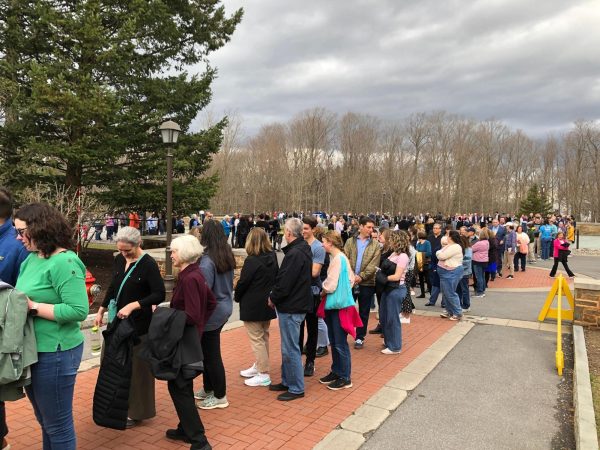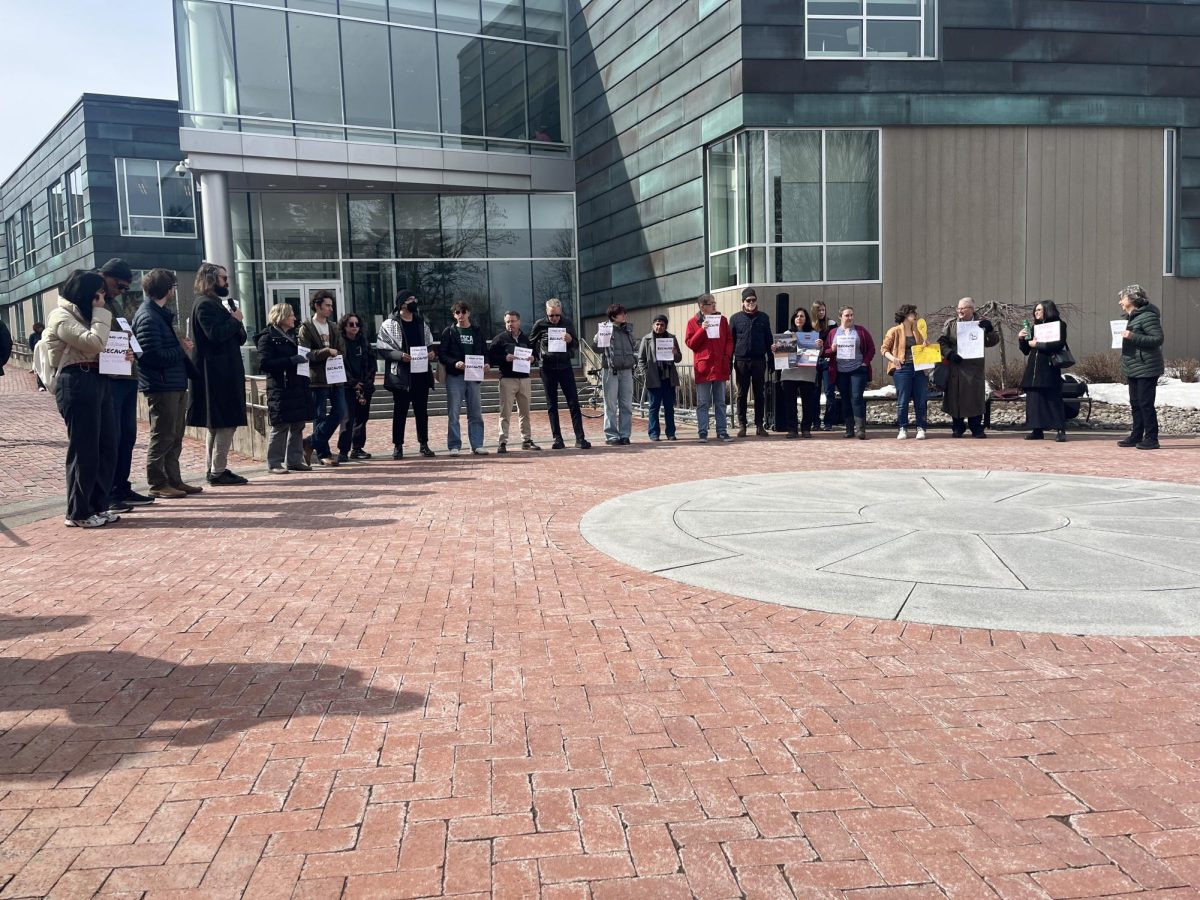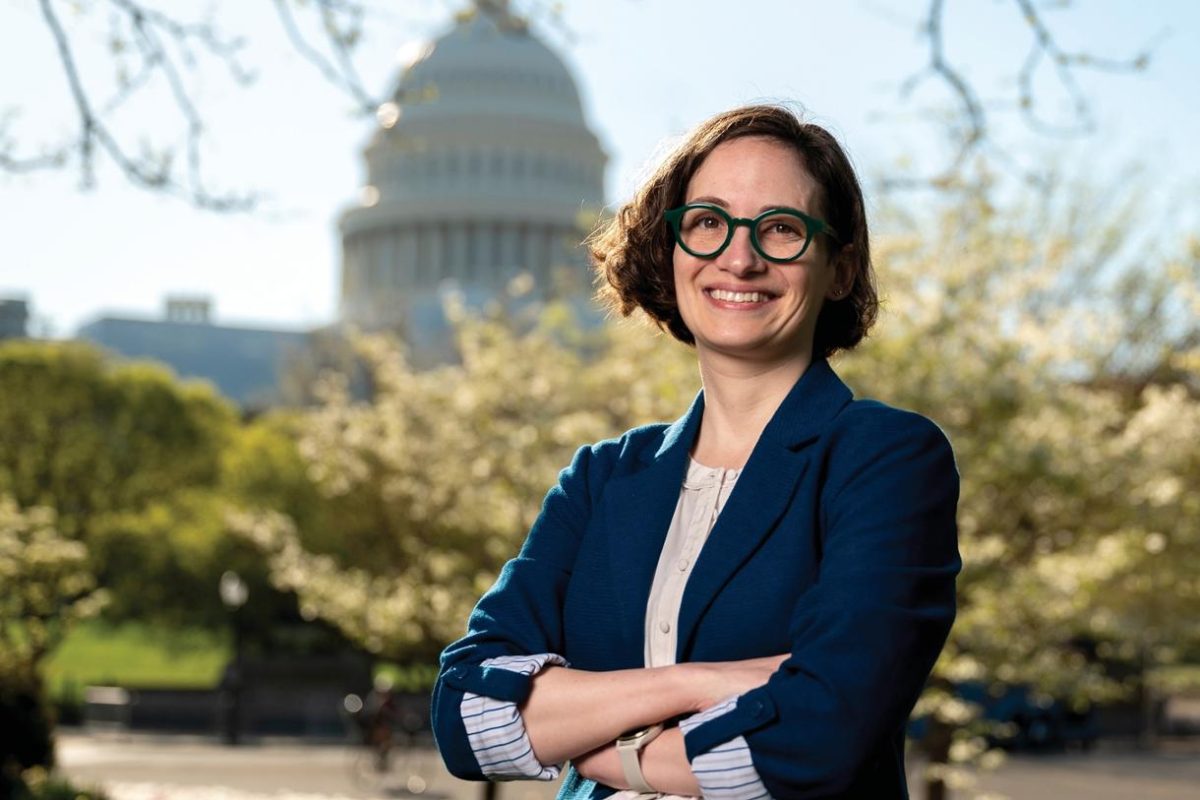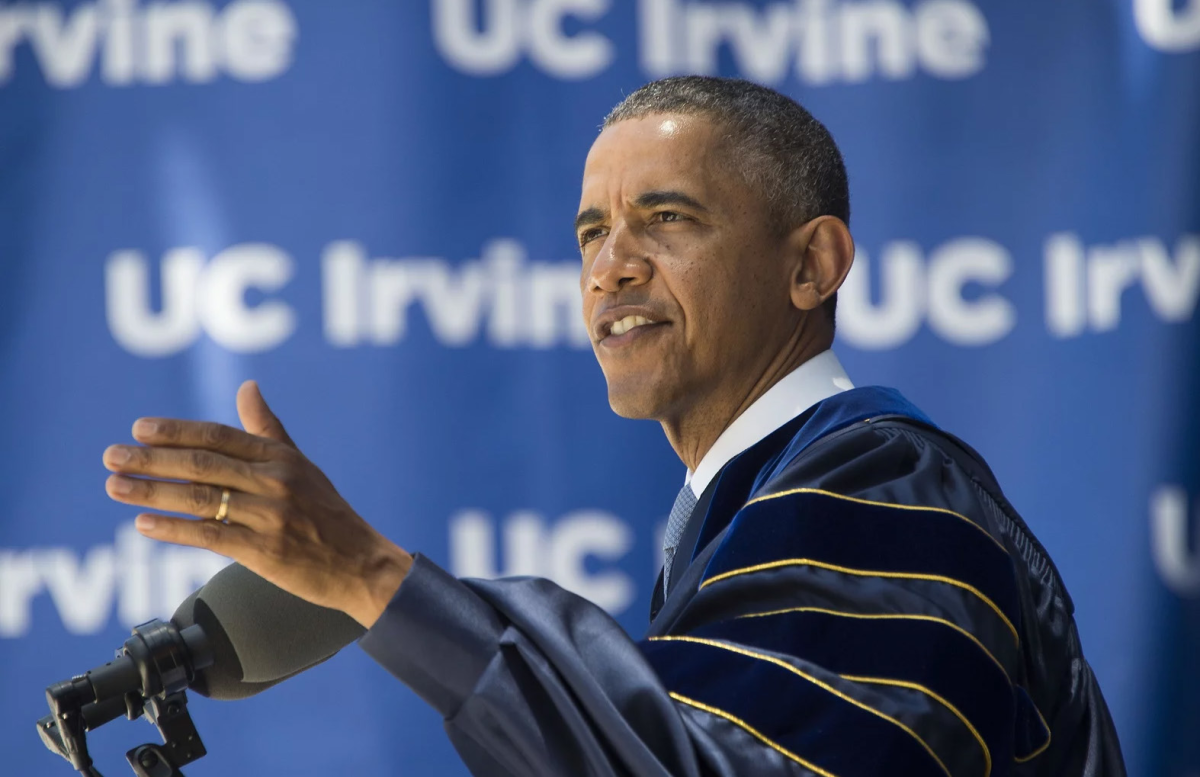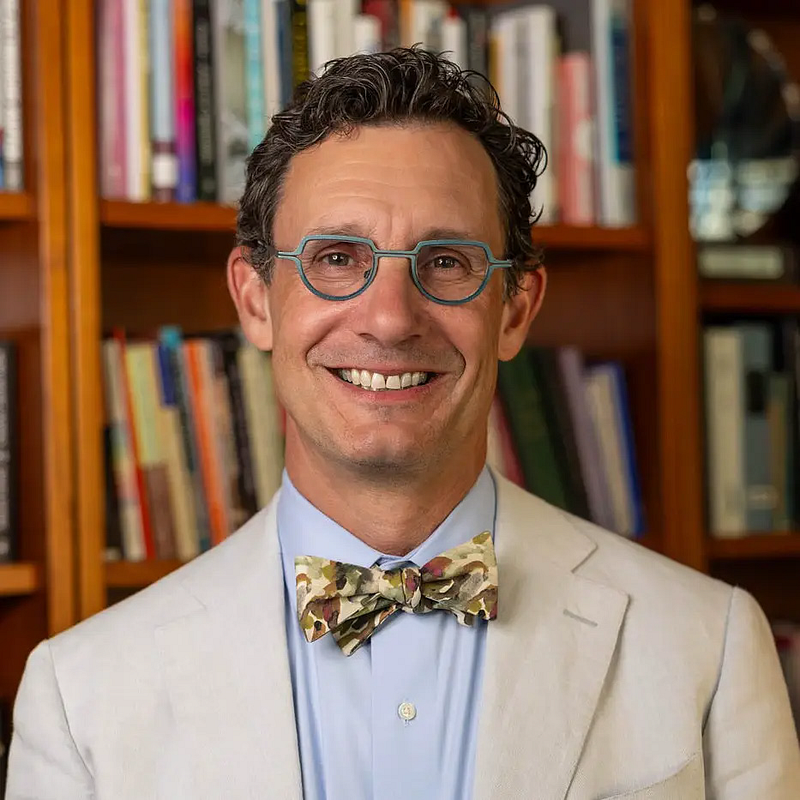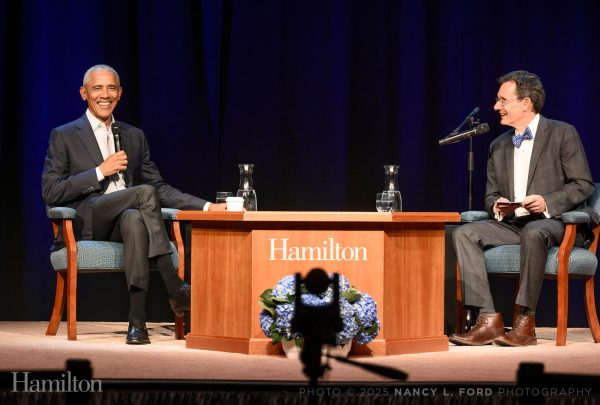
On Thursday, April 3, former President Barack Obama participated in a moderated conversation with Hamilton College President Steven Tepper at the Margaret Bundy Scott Field House as part of the Sacerdote Great Names Series.
At a time when the actions of the current administration have been criticized by many on Hamilton’s campus, Obama talked about the importance of upholding democratic values, participating in cross-party conversations and making sacrifices to stand up for what is important, especially for higher education institutions. There have been a number of recent protests on campus on issues such as cuts to federal funding of Fulbright scholarships, scientific research and the humanities and arts.
An area by the science building was set aside for demonstrations but remained empty on the day of the event. However, some flyers were put up anonymously around campus in criticism of Obama. One flyer said, “Obama normalized drone strikes—including double tap strikes—on civilians. Obama ordered 10 times more drone strikes than his infamous warmongering predecessor Bush. Drone strikes, including double tap strikes, continue to terrorize Palestinians in Gaza today.”
A crowd of 5,200 students, faculty, staff and community members attended the event. At around 4 p.m., attendees began lining up in front of the Field House, while free shuttles started transporting guests who had parked in the Village of Clinton to campus.
At 7 p.m., Anna Gnapp ’26, President of the Student Government Alliance, provided an introduction for Obama, acknowledging his accomplishments during his presidency. “[Obama’s] leadership helped rescue the economy, revitalize the American auto industry, reform the healthcare system and put the country on a firm course to a clean energy future, all while overseeing the longest stretch of job creation in American history,” she said.
On behalf of Hamilton College, Gnapp thanked the Sacerdote family for supporting the Great Names Series, and Tom Vilsack ’72, who served as the U.S. Secretary of Agriculture during the Obama administration and met with students earlier in the day. “I believe Alexander Hamilton, this college’s namesake and a founding trustee, would be proud of Mr. Obama’s presidency as an example of his highest hopes for this country,” Gnapp said before inviting Obama to the stage to resounding applause and a standing ovation from the audience.
“Hard act to follow after Anna,” Obama said once seated on stage. “She’s fantastic. I also understand that she’s on the basketball team, so you know I like that, and I appreciate the fact that she didn’t mention that her bracket is doing better than mine.”
Tepper opened the conversation with Obama by asking the question “What is life like now out of the White House?”.
“Well, right now, at the moment, I’m splitting time between the work for the foundation,” Obama said, referring to the Barack Obama Foundation––a Chicago-based nonprofit organization founded in 2014 that offers a variety of programs, scholarships, career training and leadership networking opportunities for students and professionals.
“Michelle and I set up the Obama Foundation to train the next generation of leaders here in the United States and around the world, and that keeps me busy,” he said. “I am also finishing the second half of my presidential memoirs, which in case any of you feel sorry for yourself, this is like 50 term papers,” he said, to laughter from the audience.
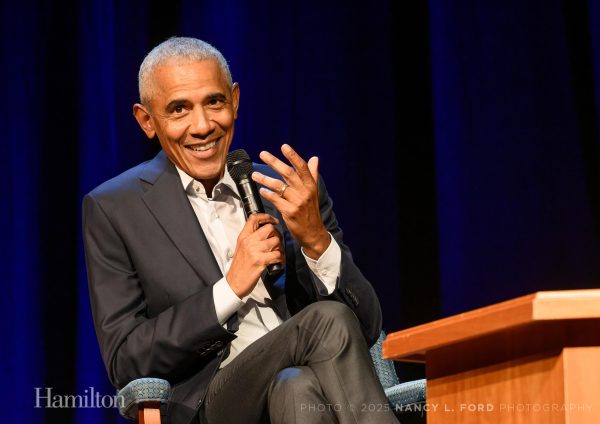
“Here at Hamilton College, we really pride ourselves on graduating master communicators. People know how to write, who know how to communicate, who know how to tell stories,” Tepper told Obama. “You’re one of the best communicators in the modern era. I mean, this is an art form. Could you let us in a little bit into your creative process? How do you tell a compelling story? How do you advance an idea?”
“When I started as a politician and public speaker, I was often terrible,” Obama said. “I think that the first thing to know about speaking, writing or communicating generally is if you practice like everything else, you can get better.”
Obama emphasized the importance of believing in what you say and speaking with conviction to communicate effectively and authentically. He also advised speaking “like a normal human and not like a book.”
“I’m always puzzled by people who, in speaking to an audience… will try to go out of their way to talk in ways that they’d never talk to their friends or neighbors or family members or coworkers or fellow students.”
Obama said that the information that resonates most with people is rooted in personal experiences or the experiences of others. He admitted that early in his political career, he wasn’t the best communicator because he would often fill his speeches up with “facts and policies,” without the narratives that audiences connect with.
Tepper then shifted the conversation towards the growing distrust in government. “It appears that many people in this country have lost not only trust in government, but maybe even more importantly, the relevance of democratic norms that undergird our government,” he said. “Why has that happened? Does it matter? What can we do to repair it?”
“Let me preface this by saying what everybody knows, which is that I have deep differences of opinion with my most immediate successor—who’s now president once again,” Obama said. However, he emphasized that for much of the post-World War II era, there was a broad consensus across political parties on the foundational principles of American democracy.
He noted that certain bonds––embodied in the Constitution and Bill of Rights––transcend party, region or ideology. Principles such as the rule of law, separation of powers, an independent judiciary, freedom of worship and freedom of the press were universally upheld for the most part, even if imperfectly. Even though Obama cited instances of corrupt politicians, abuses of power and vast differences in access and influence, he argued that the ideals of democracy remained a guiding principle for the nation.
“I do believe that our commitment to those principles has eroded, and I think it eroded in part because the government itself got really big. What that meant is sometimes it felt distant and unresponsive, and rules are a hassle,” Obama said.
Referring to the current administration, Obama said he is “deeply concerned with a federal government that threatens universities if they don’t give up students who are exercising their right to free speech.”
“I am more troubled by the idea that a White House can say to law firms, ‘If you represent parties that we don’t like, we’re going to pull all our business or bar you from representing people effectively,’” he said. “That kind of behavior is contrary to the basic compact we have as Americans.”
“Imagine if I had done any of this,” Obama said, to cheers and applause from the audience. “It’s unimaginable that the same parties that are silent now would have tolerated behavior like that from me, or a whole bunch of my predecessors.”
“The most important office in this democracy is the citizen, the ordinary person who says, ‘no, that’s not right.’ I do think one of the reasons that our commitment to democratic ideals has eroded is that we got pretty comfortable and complacent,” Obama said.
Obama argued that we have reached a point where sacrifices may be required to stand up for causes that people believe in. He pointed to law firms and universities as examples, suggesting that firms may have to accept lost business to uphold principles, while universities may need to use their own resources––such as endowments––to prioritize academic freedom.
“We say we’re for equality. Are we willing to fight for it?,” Obama asked the audience. “Are we going to risk something for it?”
Obama told Tepper he has been glad to hear about the Common Ground initiative on Hamilton’s campus as a way to promote cross-boundary dialogue and productive conversations.
“I have been absolutely clear throughout my presidency, post-presidency, the idea of canceling a speaker who comes to your campus, trying to shout them down and not letting them speak, even if I find their ideas obnoxious, well, not only is that not what universities should be about, that’s not what America should be about,” Obama said. “You let them speak and then you tell them why they’re wrong. That’s how you win the argument.”
In an interview following the Obama discussion, Tepper was asked whether Obama’s positive view of the Common Ground initiative affirms the importance of the values promoted by the program and that the college is willing to defend this program even when critiqued by students or faculty.
“Absolutely,” Tepper said. “No program is ever perfect, and we’ll continue to evolve it, but I think ultimately you have to ask, was the program successful at generating its purpose, which is to get people to talk across differences. That is our only criteria for success, not whether you like the speaker or didn’t like the speaker.”
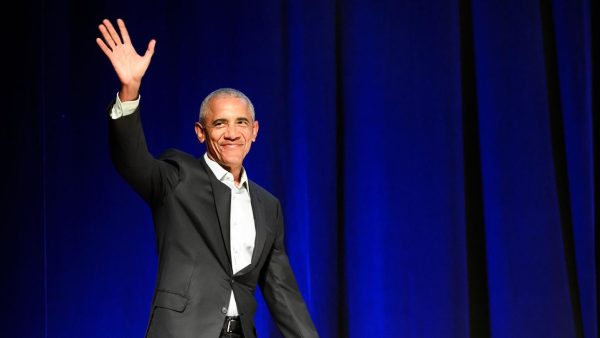
During the Great Names lecture, Obama talked about the reasons why he thinks that political polarization is seemingly at an alltime high and the ability to see other perspectives has been broken.
“Today, we have these siloed communities online that never meet, and all they’re doing is reinforcing, over and over again, the ideas that everybody agrees with,” he said. “And anybody who strays from the orthodoxy or the dogma that exists online can be attacked, often viciously, because it’s easier to go after somebody if you’re not sitting with them face to face.”
“I say all this to say that the more we can encourage, I believe, space, institutions, practices that just get people talking to each other and working together on something in the real world, the more likely we are to break down some of that polarization and rebuild trust,” he said.
Tepper transitioned the conversation towards a focus on the future of AI, highlighting its potential as a benefit to humanity but needing guardrails to make sure it remains safe, fair and ethical.
Obama said that he believes AI will be even more impactful than the invention of smartphones. “It is going to come faster, and the reason is that its applications aren’t just in the communications and information area. It has potential application across the board,” he said.
“Already, the current models of AI…they can code better than, let’s call it 60-70% of coders. We’re talking highly skilled jobs that pay really good salaries, and that, up until recently, has been entirely a seller’s market in Silicon Valley,” he added.
“A lot of that work is going to go away,” Obama said. “The best coders will be able to use these tools to augment what they already do. But for a lot of routine stuff, you just won’t need a coder, because the computer or the machine will do it itself.”
Obama argued that unless someone was in the top 1% of understanding how to code, “you’re better off with a liberal arts education.”
In response to Obama’s remarks on AI, Chair and Associate Professor of Computer Science Thomas Helmuth ’09 issued a statement on behalf of the department: “While AI agents have started to and will continue to automate some tasks performed by knowledge workers, including some coding, I believe that well-trained computer scientists will continue to play an important role in the tech world. I don’t expect that software development jobs will decrease drastically any time soon because of replacement by AI.”
“Software development requires many skills that go beyond writing code, including understanding client needs, discussing requirements, testing and debugging written code and maintaining and securing existing code. Most software developers spend the majority of their time on these non-coding tasks that cannot easily be automated by AI,” Helmuth said. “Having a strong background in computer science will give our students the skills they need to effectively use AI where appropriate.”
“I am a strong proponent of a liberal arts education, and think our computer science majors benefit greatly from the courses they take outside of computer science. A strong background in oral and written communication, paired with an understanding of humanities, social science and the arts, will continue to make our computer science majors highly sought after in the job market,” Helmuth said in the statement.
Tepper’s final question to Obama asked for his advice on how students can make a difference.
Obama reflected on a tradition in the Oval Office where each president designs their own rug. During his presidency, Obama’s rug featured a series of quotes stitched into the rim, including one by Dr. Martin Luther King Jr. (although its origin is debated): “The arc of the moral universe is long, but it bends toward justice.”
“There’s a faith in that, but people forget the first clause of it, which is, ‘The arc of the moral universe is long,’” Obama said. “And what we talk about with our leaders, particularly young people, is a recognition that change does not happen overnight, that history zigs and zags, that sometimes we take two steps forward, and then we take a step back.”
“I guess the main message I have for all of you, which we talk a lot about with our leaders, is, do not get discouraged because you don’t fix everything all at once,” Obama said. “That kind of resilience, I think, is, more than anything, what’s needed, understanding that if you work hard, you’re still going to fail sometimes.”
“People are imperfect, but it’s worth trying. And if you try, not only do you usually end up getting better outcomes, but you’re going to live a better life. You’re going to feel better about yourself, and you’re going to find fellow travelers who share those values, and that’s as important as any of it.”
